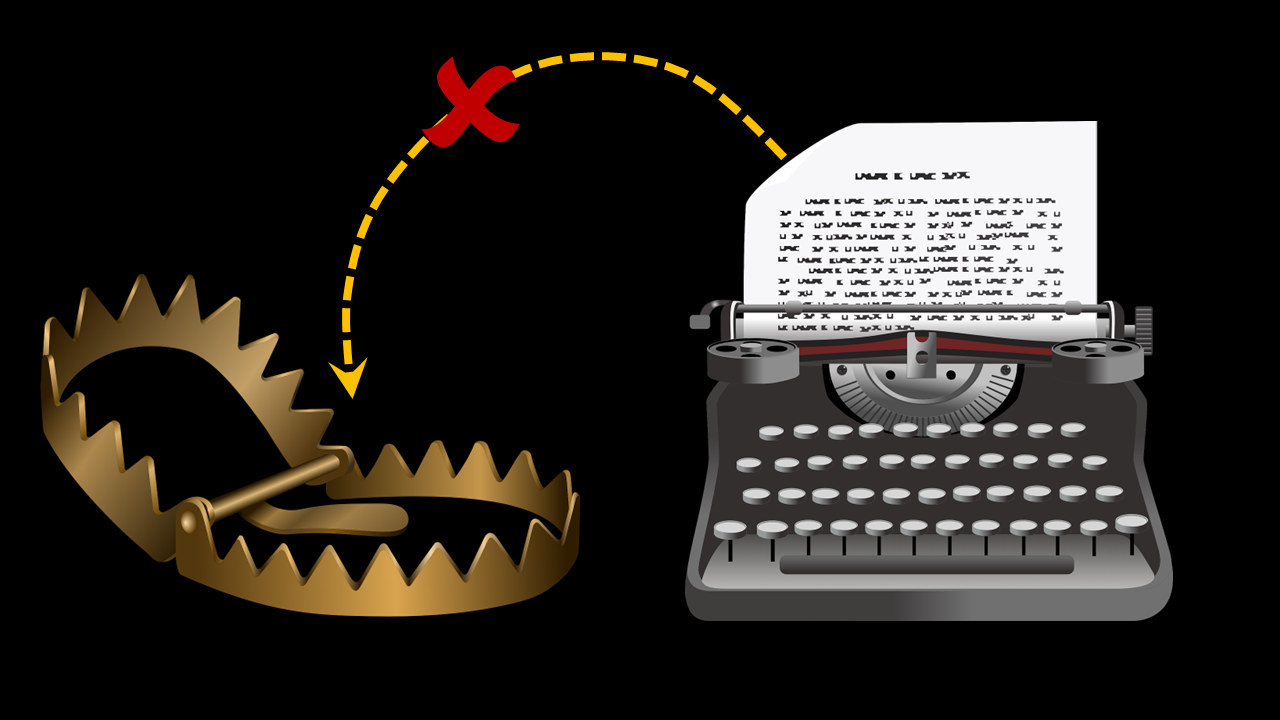Lawyers encounter hypothetical scenarios and conditional situations daily, so they must consider what might happen or what could have happened. Two powerful tools help lawyers write about hypotheticals with precision and clarity: the subjunctive mood and conditional phrasing.
Continue readingDanielle Cosimo and Ivy Grey

Recent Posts
Stop Fighting the Hypothetical: Using the Subjunctive Mood and Conditional Phrasing in Legal Writing
Choosing the right pronoun to use when writing is harder than you might expect. Some pronouns serve several functions; some pronouns don’t change to show number or gender, and others seem redundant. There’s also social pressure to sound “sophisticated.” It’s no wonder writers are confused! Let's explore the proper usage of reflexive pronouns and first-person pronouns.
Continue readingSomewhere along the way, most of us have heard the advice, “good writing uses transitions.” So we picked up words like however, therefore, moreover, and in addition and started sprinkling them into our sentences like magic dust. Transitions, we were told, make writing flow.
Continue readingHave you ever had your work edited by a grammar whiz and found a note scrawled in the margin reading “fused participle”? Like most people, you probably wondered what the heck that note meant. If you looked it up, you were confronted by a deluge of grammar terms—so you gave up. Don’t worry, we don’t blame you. It is confounding. But to write in formal prescriptive English, you must know what fused participles are and how to wrangle them.
Continue readingIt may seem efficient to use generative AI (GenAI) tools to write content for you. You’re busy. Maybe you’re not deeply invested in the final product. Maybe you just want to be done. However, GenAI often produces text that is bland, abstract, repetitive, obvious, and just awkward—especially compared to a human writer who knows the topic well.
Continue readingAdmit it: You’re proud of your writing skills. They give you enviable power. You can wield English grammar and vocabulary like a sculptor’s chisel or a warrior’s axe. You’ve thrived in fields where your long, complex (but clear) sentences with lots of Latin syntax and vocabulary roots show your expertise. But what if, by setting these skills aside sometimes, you could make your writing even more powerful? What if you could have a greater effect on your audience by changing your writing style to better fit their needs? You can create more powerful and effective messages when you write in plain language. WordRake can help you achieve this transformation faster and more efficiently.
Continue readingPrepositions can add valuable detail and complexity to sentences, but they also invite nominalizations, passive constructions, and bloat. When these single-word connectors pile up in writing, you can kill the flow of your sentence and confuse your reader. What could make this worse? Multi-word prepositions.
Continue readingWhen you’re looking to cut words, that is a good target. It’s often redundant and space-wasting. But before your CTRL+F to delete every instance of that to get under page limits, reconsider. That is actually a complex word with multiple meanings and grammatical possibilities, which means sometimes that is grammatically necessary and sometimes it just makes your sentence much clearer.
Continue readingBefore the first day of your 1L year, you probably spent 30 minutes reading one page of a 17th century case (and dreaded having to read nine more before class). If you were anything like me, you sighed and consulted Black’s Law Dictionary to decipher the terminology combined in doublets and triplets—and were often disappointed to find the words were near-synonyms or out of use. You rightly identified these terms as archaic and redundant. But by the end of your 3L year, you were unfazed by the English, French, and Latin terms mixed within dense blocks of text. You could even understand what you read and use it to argue for classroom clients! You were ready to enter the profession, thinking and writing like a lawyer.
Continue readingWhen you see several potential verbs in a short sentence, but only one of them ends with -ing—and it isn’t driving the action—your sentence may have fallen into the Gerund Trap. If the -ing word represents an abstract idea and it’s the first word in a sentence or independent clause, then you’re almost certainly in the Gerund Trap. You may be surprised to learn that your -ing word isn’t functioning as a verb at all: it’s a noun! (By definition, a gerund is a verb in its -ing form that functions as a noun.)
Continue readingTo tighten each sentence, search for redundant words where the meaning could be clearly expressed with a single word. Most writers know to eliminate doublets and triplets, but overlook other redundancies in:
- word pairs or groups where the meaning of a word implies or includes its modifier
- word pairs or groups where the specific word implies the general category
- throw-away phrases that describe the writer’s intentions, give directions to the reader, or describe the structure of the text
Something feels off about your new robot co-worker—besides the fact that your co-worker is a robot. This robot produces grammatically correct text at lightning speed. The writing seems natural, not robotic. It’s impressive, but is this text good and should you adopt it as your own?
Continue readingIntensifiers are like vitamins— they’re meant to strengthen but become poisonous when you exceed the recommended dose. Let’s save you from your childhood writing (and chewable vitamin) mistakes.
Intensifiers are words or expressions designed to intensify the words around them, but often have the opposite effect. They are usually adjectives and adverbs, and they are particularly bad when used to modify absolute words. Common intensifiers include very, really, incredibly, and extremely.
Continue readingIn sales and marketing you’re advised not to talk past the point of the sale. That means when the buyer says yes, you stop trying to sell them. Continuing to talk may turn your yes into a no. This is also good advice for writing: Once you’ve made your point, stop.
Though much writing advice focuses on how to cut to the point, little advice discusses how to stop once you’ve reached it. Yet restraint will make your sentences powerful and your documents readable.
Continue readingWriters slow down their sentences with unnecessary words that delay the point. They may do this because middle school English teachers told them to use transitions; they read great 19th century writers renowned for languid and balanced sentences; or they’re trying to sound sophisticated by relying on industry clichés. Your readers won’t care why you write as you do—they will only care that they must read it. So do them a favor and cut the clutter.
Continue readingWriting in active voice is often cited as a core part of plain language. Though the idea seems simple, it becomes confusing when you see phrases like active voice and active verbs used interchangeably. In this article, we’ll clarify the difference and help you choose the right voice to communicate your ideas. The better your understanding of language, the better you’ll communicate with your audience—and that’s the goal of plain language!
Continue readingEven the best writers fall back on common expressions that add unnecessary and repetitive words to their writing. This repeated information is most often added as time-related information to sentences in which the verb tense or another part of speech already shows the reader the time information.
Continue readingPronouns help writers shorten their sentences and vary their word choices so writing doesn’t seem repetitive. A pronoun is a short, generic word that replaces a noun. It can have one of three jobs:
Continue readingWhat difference can three or four letters make? When they form pronouns, these short words can have a big impact. Pronouns are words used in place of other nouns. They reduce repetition, which improves the clarity, pace, and flow of a sentence or paragraph. Without pronouns, sentences would be longer and messier and communication would become more difficult. In a world without pronouns, reading and speaking would be painfully boring. To see the difference pronouns can make, consider these two sentences.
Continue reading





















